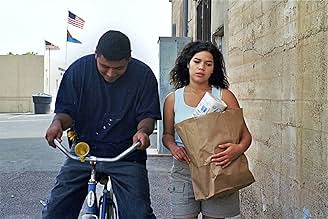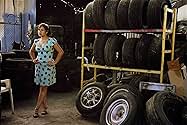Three generations of women in a Mexican American family experience sexual awakenings over the course of a summer.Three generations of women in a Mexican American family experience sexual awakenings over the course of a summer.Three generations of women in a Mexican American family experience sexual awakenings over the course of a summer.
- Director
- Writer
- Stars
- Awards
- 5 wins & 2 nominations total
Roman Arabia
- Oswaldo
- (as Victor Wolf)
- Director
- Writer
- All cast & crew
- Production, box office & more at IMDbPro
Featured reviews
The Garcia girls consist of women from three successive generations: Dona Genoveva (Lucy Gallardo), the septuagenarian matriarch of the clan; Lolita (Elizabeth Pena), her stressed-out single-mother daughter; and Blanca (America Ferrera), her just-beginning-to-learn-about-life teenaged granddaughter. As the middle person in the hierarchy, Lolita has her hands full dealing with not only her own issues of a middle-aged divorcée struggling to make something of her own life, but those of an aging mother who's suddenly decided she wants to learn how to drive and to become romantically involved with the family gardener, and of a daughter who's just beginning to learn about boys and the strange impulses and yearnings that are suddenly pouring forth from her rapidly changing body.
At its core, "How the Garcia Girls Spent Their Summer" shows how the problems of sex, love and relationships cut across all generational lines. Genoveva, for instance, is every bit as interested in achieving physical intimacy with a man as is her virginal teenaged granddaughter. In fact, this is one of the rare films that even acknowledges, let alone dramatizes, the fact that older people can be every bit as sexually preoccupied and sexually active as their much younger counterparts. And the movie also notes that the social and religious taboos placed on senior citizens having sex are every bit as intense as those placed on youngsters for the same thing. And caught in the middle of all this is Lolita, who often doesn't know quite what to make of either her mother or her daughter - or how to find the right balance between her own desires and needs and the responsibilities of being a breadwinner, a supportive daughter and a guiding force in her child's life.
As written and directed by Georgina Riedel, "How the Garcia Girls Spent Their Summer," which is set in a small dusty town in the Desert Southwest, focuses so intensely on the minutiae of the everyday lives of these women that it's bound to leave some in the audience feeling restive and impatient throughout large stretches of the film. The movie is filled with languid scenes where not a whole lot seems to be happening, and the pacing is often more desultory than it needs to be, which doesn't make the time go any faster. Yet, in a way, the style effectively picks up the rhythm of life in a sleepy town, where the wealth of experience seems frustratingly curtailed and the future itself sadly limited. In fact, Riedel periodically cuts away from the "action" to focus on a group of elderly gentlemen who sit around all day discussing what they've learned over the years about cars and girls, in roughly similar terms - which explains a great deal about just what these women have to deal with on a daily basis just trying to come to terms with their own roles in a largely male-dominated world. And beyond the uncompromisingly truthful and understated performances by the three leading ladies, the director demonstrates a keen eye for composition that makes the film at least visually interesting even when the drama itself isn't always engaging us completely.
Thus, for all its flaws, "How the Garcia Girls Spent Their Summer" provides many compelling insights into what it means to be a woman - in particular an Hispanic woman - in the modern world.
At its core, "How the Garcia Girls Spent Their Summer" shows how the problems of sex, love and relationships cut across all generational lines. Genoveva, for instance, is every bit as interested in achieving physical intimacy with a man as is her virginal teenaged granddaughter. In fact, this is one of the rare films that even acknowledges, let alone dramatizes, the fact that older people can be every bit as sexually preoccupied and sexually active as their much younger counterparts. And the movie also notes that the social and religious taboos placed on senior citizens having sex are every bit as intense as those placed on youngsters for the same thing. And caught in the middle of all this is Lolita, who often doesn't know quite what to make of either her mother or her daughter - or how to find the right balance between her own desires and needs and the responsibilities of being a breadwinner, a supportive daughter and a guiding force in her child's life.
As written and directed by Georgina Riedel, "How the Garcia Girls Spent Their Summer," which is set in a small dusty town in the Desert Southwest, focuses so intensely on the minutiae of the everyday lives of these women that it's bound to leave some in the audience feeling restive and impatient throughout large stretches of the film. The movie is filled with languid scenes where not a whole lot seems to be happening, and the pacing is often more desultory than it needs to be, which doesn't make the time go any faster. Yet, in a way, the style effectively picks up the rhythm of life in a sleepy town, where the wealth of experience seems frustratingly curtailed and the future itself sadly limited. In fact, Riedel periodically cuts away from the "action" to focus on a group of elderly gentlemen who sit around all day discussing what they've learned over the years about cars and girls, in roughly similar terms - which explains a great deal about just what these women have to deal with on a daily basis just trying to come to terms with their own roles in a largely male-dominated world. And beyond the uncompromisingly truthful and understated performances by the three leading ladies, the director demonstrates a keen eye for composition that makes the film at least visually interesting even when the drama itself isn't always engaging us completely.
Thus, for all its flaws, "How the Garcia Girls Spent Their Summer" provides many compelling insights into what it means to be a woman - in particular an Hispanic woman - in the modern world.
First off, after speaking to the director at the night of the Latin Film Festival here in New York, I would like to again commend her for a job well done. I am also a first time director so I definitely correlated to a lot of the jerky camera movements and experimental camera shots that were probably theorized but never executed to their fullest extent. There were also some doubtful moments with audio at times; however, having discussed these decisions with her personally I came to an understanding as to why they were done. This of course does not take away from the obvious, the film did drag, and it definitely needs some severe editing adjustments. The three raunchy sex scenes were left on screen for a reason, not only to try something new, but to give the audience a feel for a real life situation that women face in an every day environment. The scenes can be shortened however and still give the audience the same feel. The length they are at now makes the scenes disturbing and deteriorates from the comedic undertone that was originally intended by the director. There are many other comedic ploys executed that trick the audience into thinking something evident is about to happen, when it really doesn't. These techniques keep the audience in a(n) intriguing suspense, but you can only have our attention for so long.
ArizWildcat has the exact right idea! (and not just because I also went to the U of A!) I work in the town where this was filmed and set...and it's not a desolate as the movie depicts. The movie needs some serious editing...too many artsy languid shots. The story is OK...some funny parts, although I don't know if they were intended to be funny. Some of the scenes could have been shorter (a certain bathtub scene, for one!) It is not rated, as of yet, but it is NOT for children. With a good editor, this could be a better movie. One shot which started wide and SLOWLY zoomed in to close up was somewhat jerky. I was aware of the zoom in slow, jerking movement, rather than being a slowly fluid zoom. I'm not a filmmaker, but it looked like the amateurish job I would have done with my camcorder! Of course, I may be nitpicking, but those are the things I noticed.
I finally rented this over the Christmas holiday. Like some of the other reviewers, I too am from the same small town where this film is set. When I came across this film at the video store, I thought it would be interesting to see Somerton on the big screen (or my flat screen). What I found instead, was a frighteningly accurate depiction of life in this small town. Not only does the film artistically capture three generations of beautiful, strong women, it also captures the soul of a small agriculturally based Latino town. The audio was a little interesting at first, but it really adds to the beauty of this film... To all who made this film a possibility, You don't make me want to live there ever again, but you did Somerton proud!!!
We saw this film at Sundance, and looked forward to seeing it as it was filmed in our favorite state! The idea of the story is a good one, and there were many scenes that worked well. However, some editing is needed here. The movie is much too long (over 2 hours) and parts of it just dragged by. The filmmaker had lots to say, but much of what was said in the movie could have easily been shown in a much shorter version. Many scenes went on and on when we got the idea in the first few seconds. The dialog was stilted and unnatural in several scenes, which was distracting. There were some side stories that were completely unnecessary to the main idea of the film. However, the performances by the 3 lead actresses were wonderful, and the three of them make this movie worth watching.
*note* I see that I am in the "hated it" category for reviews. I didn't hate the movie, I just thought it was a bit flawed.
*note* I see that I am in the "hated it" category for reviews. I didn't hate the movie, I just thought it was a bit flawed.
Did you know
- TriviaFinal film of Lucy Gallardo.
Details
- Release date
- Country of origin
- Official site
- Languages
- Also known as
- Secretos de verano
- Filming locations
- Production companies
- See more company credits at IMDbPro
Box office
- Gross US & Canada
- $215,303
- Opening weekend US & Canada
- $91,432
- May 18, 2008
- Gross worldwide
- $215,303
- Runtime
- 2h 8m(128 min)
- Color
- Sound mix
- Aspect ratio
- 2.35 : 1
Contribute to this page
Suggest an edit or add missing content































